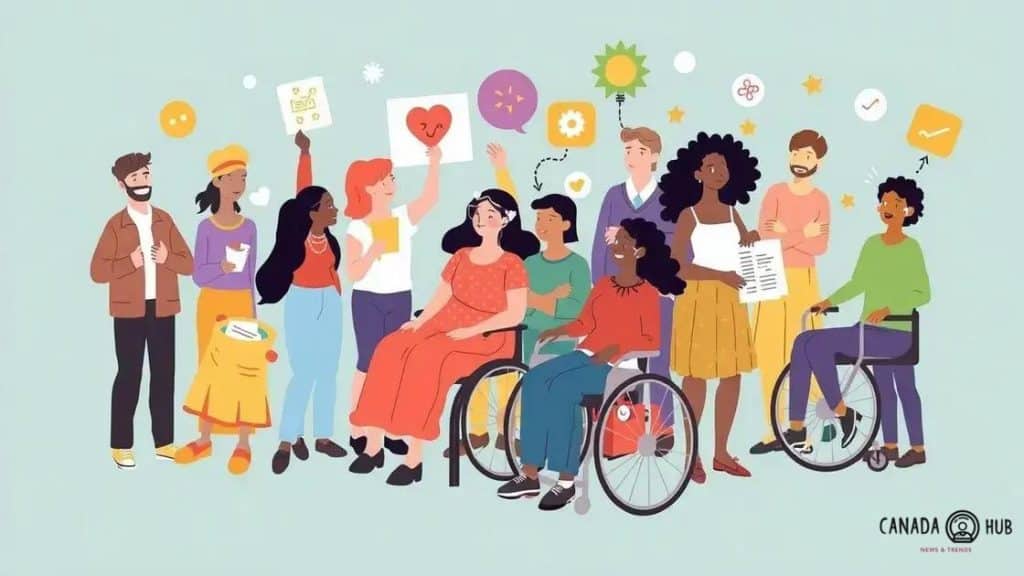Introduction of new disability benefits eligibility criteria

The introduction of new disability benefits eligibility criteria expands support for individuals with disabilities, aiming to simplify the application process and enhance access to essential resources and assistance.
Introduction of new disability benefits eligibility criteria marks a significant shift in support for individuals in need. Have you been wondering how these changes might impact you or someone you know? Let’s dive in to explore the details.
Understanding the new eligibility criteria
Understanding the new eligibility criteria for disability benefits is essential for anyone seeking assistance. The recent changes aim to make the process more inclusive and accessible for those in need.
Criteria Overview
The new criteria emphasize a broader understanding of disabilities. They consider not only physical impairments but also mental health conditions. This approach recognizes that disabilities can impact daily functioning in various ways.
Key Factors to Qualify
Several key factors determine eligibility under the revised guidelines:
- Severity of the condition: How significantly does the disability affect your life?
- Duration of the condition: Has the impairment persisted for a long time?
- Ability to work: Can the individual engage in any work despite the disability?
These factors are essential in assessing qualifications. The new eligibility criteria require thorough documentation, including medical records and personal statements to support your application.
Another important aspect of the new criteria is how the definition of disability is expanding. Previously, many conditions were excluded, but now, individuals with mental health conditions, chronic illnesses, and other previously overlooked issues can apply.
Comparison to Previous Criteria
It’s crucial to understand how these new eligibility criteria differ from the old ones. In the past, the focus was mainly on physical disabilities, which left many without support. With the latest adjustments, a more holistic view is adopted, encouraging applicants to share their experiences and the challenges they face.
As you navigate the changes, be aware of additional resources available, including support groups and advocacy organizations. These can provide assistance in understanding the new disability benefits system. By staying informed, you can better advocate for yourself or others who might benefit from these changes.
Who qualifies for disability benefits?
Knowing who qualifies for disability benefits is crucial for individuals seeking assistance. The eligibility criteria are designed to include a diverse range of disabilities and personal circumstances.
General Qualifications
To qualify, applicants must meet several basic requirements. First, individuals must prove that they have a disability that significantly impairs their daily activities. This could be a physical condition, a mental health issue, or a learning disability.
Specific Conditions
There are specific categories of disabilities that qualify for benefits:
- Physical disabilities: These include conditions like paralysis, epilepsy, or severe arthritis.
- Mental health conditions: Depression, anxiety disorders, and schizophrenia are recognized.
- Chronic illnesses: Conditions such as diabetes or heart disease can also be qualifying factors.
Each category may have further specifications. For example, someone with a physical disability must show how their condition impacts their ability to work or perform daily tasks. It’s important for applicants to provide comprehensive medical documentation, including doctors’ notes and therapy records.
Another important factor to consider is the duration of the disability. Typically, a disability must last or be expected to last for at least 12 months. This ensures that benefits go to those with long-term needs. Sometimes, individuals can qualify if their disability is terminal, meaning it significantly limits life expectancy.
Income and Work History
In addition to the medical requirements, applicants must also consider their income and work history. The program assesses whether the individual has worked long enough and paid sufficient Social Security taxes. This aspect is crucial for determining eligibility.
Understanding these factors will help individuals navigate the qualification process more effectively. Individuals seeking benefits should also reach out to local support organizations for assistance with their applications. This can be a valuable resource for understanding the specific steps involved in securing assistance.
Key changes in the application process
Understanding the key changes in the application process for disability benefits is essential for applicants. Recent updates have made the process more streamlined and user-friendly, which helps individuals access the support they need more efficiently.
Online Application Enhancement
One significant change is the enhanced online application system. Applicants can now complete their forms digitally, which saves time and reduces errors. The online platform also provides helpful prompts and guidelines that make the process clearer.
Documentation Requirements
Additionally, the required documentation has been clarified. Applicants should gather crucial materials such as:
- Medical records: Detailed notes from healthcare providers.
- Personal statements: Descriptions of how the disability affects daily life.
- Proof of income: Documentation of financial status and work history.
These documents must be submitted with the application to support claims effectively. It’s advised to keep copies of all documents for your records.
Another important update is the personal interview process. In many cases, interviews can now be conducted virtually, allowing for greater flexibility and convenience for applicants. This change can significantly reduce the need for travel, making the process more accessible for individuals with mobility challenges.
Timeline for Decisions
The timeline for receiving decisions on applications has also improved. The new system aims to provide updates within shorter time frames, which means applicants will get responses more quickly. However, it’s still essential for individuals to remain patient and follow up on their applications if necessary.
Keeping up with these key changes can help potential applicants navigate the process more smoothly. Familiarizing oneself with the new requirements and processes not only eases the anxiety of applying but can also lead to quicker approvals.
Tips for a successful application
Applying for disability benefits can be daunting, but following some tips for a successful application can make the process smoother. Understanding what to do can help you submit a stronger case and increase your chances of approval.
Be Thorough with Documentation
One of the first steps is to ensure you provide all necessary documentation. This includes your medical records and any other relevant information that supports your claim. The more detailed and organized your paperwork is, the better your chances of success.
Follow Instructions Carefully
Always read the application instructions fully and carefully. Missing a step can delay the process. Each page must be completed as directed, and all questions should be answered honestly and accurately.
- Double-check: Review your application for any errors or omissions.
- Highlight key information: Make it easy for reviewers to find important details.
- Get help if needed: Don’t hesitate to ask for assistance from knowledgeable friends or professionals.
Seek out organizations that assist with applications; they can provide valuable support and advice. When you submit your application, keep copies of everything for your records.
Provide Personal Insights
Sharing your story is crucial. Along with medical documentation, including a personal statement about how your disability impacts your daily life can provide valuable context. Detail specific examples of challenges you face to help the reviewer understand your situation.
Additionally, consider including letters from friends, family, or coworkers who can provide insights into your daily struggles and support your claims. This added element can make your case more compelling.
Stay Engaged in the Process
After submitting your application, remain active in following up. Check in periodically on the status of your application. If additional information is requested, respond promptly to avoid delays.
By being proactive and prepared, you can improve your experience and increase your chances of a successful outcome in your disability benefits application.
Resources for disability support
Finding the right resources for disability support can greatly enhance the experience of those navigating the challenges that come with disabilities. Many organizations and services provide assistance and information to help individuals understand their rights and options.
Government Programs
Several government programs offer support for individuals with disabilities:
- Social Security Disability Insurance (SSDI): A federal program providing income to people unable to work due to disability.
- Supplemental Security Income (SSI): Offers financial assistance to disabled individuals with limited income and resources.
- Medicaid: Provides healthcare coverage for low-income individuals, including those with disabilities.
These programs can serve as a solid foundation for financial and medical support. It’s essential to stay updated on eligibility requirements, as these can change over time.
Local Support Organizations
In addition to government programs, numerous local organizations offer guidance and resources:
- NAMI: The National Alliance on Mental Illness provides support specifically for mental health conditions.
- ARC: The Arc advocates for individuals with intellectual and developmental disabilities.
- United Cerebral Palsy (UCP): UCP offers a range of programs to support individuals with cerebral palsy and other disabilities.
These organizations often have community resources, support groups, and educational materials that can empower individuals and their families.
Another valuable resource is the internet, where websites dedicated to disability rights and advocacy can provide important information. Online communities and forums also allow individuals to connect with others facing similar challenges, offering support and shared experiences.
Financial Aid and Grants
Many nonprofits and charities provide financial aid, grants, and scholarships for people with disabilities. Researching these can help cover medical expenses, assistive technology, and educational costs. Some well-known organizations include:
- Michael S. McPherson Foundation: Offers scholarships for students with disabilities.
- Disabled American Veterans (DAV): Provides various forms of assistance for veterans with disabilities.
Using these resources for disability support can give individuals and their families the tools they need to navigate their unique situations effectively and promote a more inclusive environment.
FAQ – Frequently Asked Questions about Disability Benefits
What are the main eligibility criteria for disability benefits?
The main eligibility criteria include having a medical condition that significantly impairs daily activities, meeting the duration requirement, and demonstrating a limited ability to work.
How can I ensure a successful application for disability benefits?
To ensure a successful application, provide thorough documentation, follow instructions carefully, and include personal insights about your condition and its impact on your life.
What resources are available to help with the application process?
There are various resources such as government websites, local support organizations, and online communities that offer guidance and assistance for the disability benefits application process.
How long does it typically take to receive a decision on my application?
The timeline for receiving a decision on your application can vary, but recent improvements aim for quicker responses. Generally, it may take several weeks to months depending on the complexity of the case.





